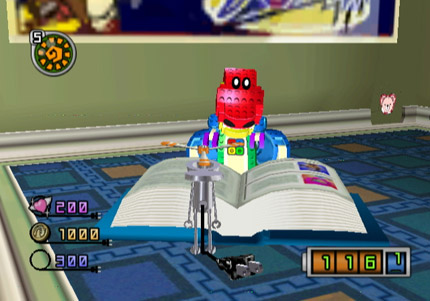The game revolves around the completely dysfunctional Sanderson family and sees the Dad buy his daughter Jenny a little robotic toy called Chibi-Robo. Chibi and his "manager" Telly Vision -- a tiny little flying TV that talks -- have been built with the express purpose of bringing "happiness" to their owners. Think of Chibi and Telly as robotic housecleaners / companions, and you'll get the idea. The ultimate aim of the game is to make Chibi rise through the ranks until he attains the highly esteemed title of Super Chibi-Robo. Telly offers tips and hints as to how to do this, but for the most part you'll be running around, cleaning up messes and solving puzzles as you go.
The game takes place in the Sanderson's abode, which is comprised of a number of different room environments. Initially, Chibi will be confined to the family room until you've learned the basic controls, how to pick up trash and how to accumulate moolah and happy points. The gameplay is pretty straightforward. Chibi is easily controlled and moves around relatively unhindered in the 3D environments. I sometimes found that the camera angles could work against you as you try to make tricky jumps or steps -- platforming makes up a huge part of the exploration -- but on the whole, things moved pretty smoothly.

In the beginning, Chibi is only equipped to perform basic tasks. The longer you play and the more puzzles you solve, the more Chibi-gear and tools become available. For example, early in the game, you'll be able to find and use Mr. Sanderson's toothbrush, which is used to scrub dirty footprints off of the floor. Doing this earns you happy points, but it also drains Chibi's finite power supply; in fact, management of Chibi's battery life is probably the single most important aspect of the game. Not to worry however, because once Chibi is running low on energy, he can simply plug himself into any electrical outlet in the house to get a full recharge.
As you progress and earn more happy points, you'll frequently be rewarded with new battery upgrades, which in turn allow Chibi to go longer between recharge sessions -- meaning you can explore further than before. The other main play mechanic is the time limit imposed day and night cycles. Defaulting to a five minute day and night when you start a new game might prove to be too challenging or, indeed, frustrating for some players, so Skip included a cool feature which allows you to increase the cycles to either 10 or 15 minutes via the purchase of a cheap upgrade. I guess you could think of this as a flexible difficulty level setting.





 Good
Good


